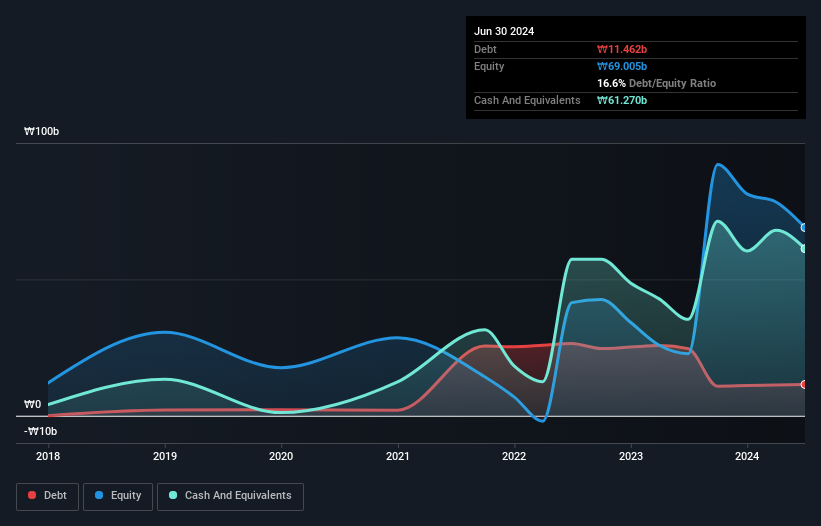- South Korea
- /
- Biotech
- /
- KOSDAQ:A310210
Health Check: How Prudently Does Voronoi (KOSDAQ:310210) Use Debt?
The external fund manager backed by Berkshire Hathaway's Charlie Munger, Li Lu, makes no bones about it when he says 'The biggest investment risk is not the volatility of prices, but whether you will suffer a permanent loss of capital.' So it seems the smart money knows that debt - which is usually involved in bankruptcies - is a very important factor, when you assess how risky a company is. Importantly, Voronoi, Inc. (KOSDAQ:310210) does carry debt. But should shareholders be worried about its use of debt?
What Risk Does Debt Bring?
Generally speaking, debt only becomes a real problem when a company can't easily pay it off, either by raising capital or with its own cash flow. Ultimately, if the company can't fulfill its legal obligations to repay debt, shareholders could walk away with nothing. However, a more usual (but still expensive) situation is where a company must dilute shareholders at a cheap share price simply to get debt under control. By replacing dilution, though, debt can be an extremely good tool for businesses that need capital to invest in growth at high rates of return. When we think about a company's use of debt, we first look at cash and debt together.
See our latest analysis for Voronoi
What Is Voronoi's Debt?
As you can see below, Voronoi had ₩11.5b of debt at June 2024, down from ₩24.6b a year prior. But it also has ₩61.3b in cash to offset that, meaning it has ₩49.8b net cash.

How Healthy Is Voronoi's Balance Sheet?
Zooming in on the latest balance sheet data, we can see that Voronoi had liabilities of ₩15.0b due within 12 months and liabilities of ₩957.1m due beyond that. Offsetting these obligations, it had cash of ₩61.3b as well as receivables valued at ₩112.8m due within 12 months. So it actually has ₩45.4b more liquid assets than total liabilities.
This short term liquidity is a sign that Voronoi could probably pay off its debt with ease, as its balance sheet is far from stretched. Simply put, the fact that Voronoi has more cash than debt is arguably a good indication that it can manage its debt safely. There's no doubt that we learn most about debt from the balance sheet. But it is future earnings, more than anything, that will determine Voronoi's ability to maintain a healthy balance sheet going forward. So if you're focused on the future you can check out this free report showing analyst profit forecasts.
Since Voronoi doesn't have significant operating revenue, shareholders may be hoping it comes up with a great new product, before it runs out of money.
So How Risky Is Voronoi?
By their very nature companies that are losing money are more risky than those with a long history of profitability. And the fact is that over the last twelve months Voronoi lost money at the earnings before interest and tax (EBIT) line. And over the same period it saw negative free cash outflow of ₩28b and booked a ₩36b accounting loss. However, it has net cash of ₩49.8b, so it has a bit of time before it will need more capital. Overall, its balance sheet doesn't seem overly risky, at the moment, but we're always cautious until we see the positive free cash flow. The balance sheet is clearly the area to focus on when you are analysing debt. But ultimately, every company can contain risks that exist outside of the balance sheet. For example Voronoi has 4 warning signs (and 2 which make us uncomfortable) we think you should know about.
When all is said and done, sometimes its easier to focus on companies that don't even need debt. Readers can access a list of growth stocks with zero net debt 100% free, right now.
New: Manage All Your Stock Portfolios in One Place
We've created the ultimate portfolio companion for stock investors, and it's free.
• Connect an unlimited number of Portfolios and see your total in one currency
• Be alerted to new Warning Signs or Risks via email or mobile
• Track the Fair Value of your stocks
Have feedback on this article? Concerned about the content? Get in touch with us directly. Alternatively, email editorial-team (at) simplywallst.com.
This article by Simply Wall St is general in nature. We provide commentary based on historical data and analyst forecasts only using an unbiased methodology and our articles are not intended to be financial advice. It does not constitute a recommendation to buy or sell any stock, and does not take account of your objectives, or your financial situation. We aim to bring you long-term focused analysis driven by fundamental data. Note that our analysis may not factor in the latest price-sensitive company announcements or qualitative material. Simply Wall St has no position in any stocks mentioned.
About KOSDAQ:A310210
Voronoi
Researches, develops, and discovers small molecule kinase inhibitors in South Korea.
Flawless balance sheet with slight risk.
Market Insights
Community Narratives


Recently Updated Narratives

Astor Enerji will surge with a fair value of $140.43 in the next 3 years

Proximus: The State-Backed Backup Plan with 7% Gross Yield and 15% Currency Upside.


A case for for IMPACT Silver Corp (TSXV:IPT) to reach USD $4.52 (CAD $6.16) in 2026 (23 bagger in 1 year) and USD $5.76 (CAD $7.89) by 2030
Popular Narratives


MicroVision will explode future revenue by 380.37% with a vision towards success


NVDA: Expanding AI Demand Will Drive Major Data Center Investments Through 2026



